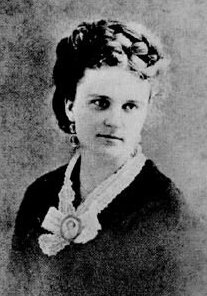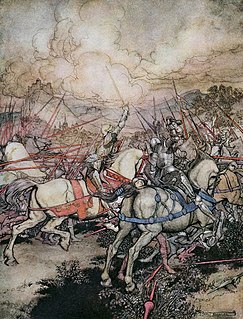The slave narrative is a type of literary genre involving the (written) autobiographical accounts of enslaved Africans, particularly in the Americas. Over six thousand such narratives are estimated to exist; about 150 narratives were published as separate books or pamphlets. In the United States during the Great Depression (1930s), more than 2,300 additional oral histories on life during slavery were collected by writers sponsored and published by the Works Progress Administration, a New Deal program. Most of the 26 audio-recorded interviews are held by the Library of Congress.

Kate Chopin was an American author of short stories and novels based in Louisiana. She is considered by scholars to have been a forerunner of American 20th-century feminist authors of Southern or Catholic background, such as Zelda Fitzgerald, and is one of the most frequently read and recognized writers of Louisiana Creole heritage.

Uncle Tom's Cabin; or, Life Among the Lowly. is an anti-slavery novel by American author Harriet Beecher Stowe. Published in two volumes in 1852, the novel had a profound effect on attitudes toward African Americans and slavery in the U.S., and is said to have "helped lay the groundwork for the [American] Civil War."

Historical fantasy is a category of fantasy and genre of historical fiction that incorporates fantastic elements into a more "realistic" narrative. There is much crossover with other subgenres of fantasy; those classed as Arthurian, Celtic, or Dark Ages could just as easily be placed in historical fantasy. Stories fitting this classification generally take place prior to the 20th century.
Southern Gothic is a subgenre of Gothic fiction in American literature that takes place in the American South.

Oroonoko: or, the Royal Slave is a short work of prose fiction by Aphra Behn (1640–1689), published in 1688 by William Canning and reissued with two other fictions later that year. It was also adapted into a play. The eponymous hero is an African prince from Coramantien who is tricked into slavery and sold to European colonists in Surinam where he meets the narrator. Behn's text is a first-person account of Oroonoko's life, love, rebellion, and execution. Oroonoko: or, the Royal Slave “centers on the unlucky love story of Oroonoko, an African prince, and the beautiful Imoinda.”

The Lost Cause of the Confederacy is an American pseudohistorical negationist mythology that claims the cause of the Confederate States during the American Civil War was just, heroic, and not centered on slavery. It has continued to influence racism, gender roles and religious attitudes in the South to the present day.

Southern United States literature consists of American literature written about the Southern United States or by writers from the region. Literature written about the American South first begun during the colonial era, and developed significantly during and after the period of slavery in the United States. Traditional historiography of Southern United States literature emphasized a unifying history of the region; the significance of family in the South's culture, a sense of community and the role of the individual, justice, the dominance of Christianity and the positive and negative impacts of religion, racial tensions, social class and the usage of local dialects. However, in recent decades, the scholarship of the New Southern Studies has decentralized these conventional tropes in favor of a more geographically, politically, and ideologically expansive "South" or "Souths".
African American literature is the body of literature produced in the United States by writers of African descent. It begins with the works of such late 18th-century writers as Phillis Wheatley. Before the high point of slave narratives, African-American literature was dominated by autobiographical spiritual narratives. The genre known as slave narratives in the 19th century were accounts by people who had generally escaped from slavery, about their journeys to freedom and ways they claimed their lives. The Harlem Renaissance of the 1920s was a great period of flowering in literature and the arts, influenced both by writers who came North in the Great Migration and those who were immigrants from Jamaica and other Caribbean islands. African American writers have been recognized by the highest awards, including the Nobel Prize given to Toni Morrison in 1993. Among the themes and issues explored in this literature are the role of African Americans within the larger American society, African-American culture, racism, slavery, and social equality. African-American writing has tended to incorporate oral forms, such as spirituals, sermons, gospel music, blues, or rap.

Anti-Tom literature consists of the 19th century pro-slavery novels and other literary works written in response to Harriet Beecher Stowe's Uncle Tom's Cabin. Also called plantation literature, these writings were generally written by authors from the Southern United States. Books in the genre attempted to show that slavery was beneficial to African Americans and that the evils of slavery as depicted in Stowe's book were overblown and incorrect.

Kindred is a novel by American writer Octavia E. Butler that incorporates time travel and is modeled on slave narratives. First published in 1979, it is still widely popular. It has been frequently chosen as a text for community-wide reading programs and book organizations, as well as being a common choice for high school and college courses.
The academic discipline of women's writing as a discrete area of literary studies which is based on the notion that the experience of women, historically, has been shaped by their sex, and so women writers by definition are a group worthy of separate study: "Their texts emerge from and intervene in conditions usually very different from those which produced most writing by men." It is not a question of the subject matter or political stance of a particular author, but of her sex, i.e. her position as a woman within the literary world. Women's writing, as a discrete area of literary studies and practice, is recognized explicitly by the numbers of dedicated journals, organizations, awards, and conferences which focus mainly or exclusively on texts produced by women. Women's writing as an area of study has been developing since the 1970s. The majority of English and American literature programs offer courses on specific aspects of literature by women, and women's writing is generally considered an area of specialization in its own right.

A house slave was a slave who worked, and often lived, in the house of the slave-owner, performing domestic labor. House slaves had many duties such as cooking, cleaning, being used as a sexual slave, serving meals, and caring for children.

Black science fiction or black speculative fiction is an umbrella term that covers a variety of activities within the science fiction, fantasy, and horror genres where people of the African diaspora take part or are depicted. Some of its defining characteristics include a critique of the social structures leading to black oppression paired with an investment in social change. Black science fiction is "fed by technology but not led by it." This means that black science fiction often explores with human engagement with technology instead of technology as an innate good.

The Slave Community: Plantation Life in the Antebellum South is a book written by American historian John W. Blassingame. Published in 1972, it is one of the first historical studies of slavery in the United States to be presented from the perspective of the enslaved. The Slave Community contradicted those historians who had interpreted history to suggest that African-American slaves were docile and submissive "Sambos" who enjoyed the benefits of a paternalistic master–slave relationship on southern plantations. Using psychology, Blassingame analyzes fugitive slave narratives published in the 19th century to conclude that an independent culture developed among the enslaved and that there were a variety of personality types exhibited by slaves.

Wild Seed is a science fiction novel by American writer Octavia Butler. Although published in 1980 as the fourth book of the Patternist series, it is the earliest book in the chronology of the Patternist world. The other books in the series are, in order within the Patternist chronology: Mind of My Mind (1977), Clay's Ark (1984), Survivor (1978), and Patternmaster (1976).

"Le Mulâtre" is a short story by Victor Séjour, a free person of color born and raised in New Orleans, Louisiana. It was written in French, Séjour's first language, and published in the Paris abolitionist journal Revue des Colonies in 1837. It is the earliest extant work of fiction by an African-American author. It was noted as such when it was first translated in English, appearing in the first edition of the Norton Anthology of African American Literature in 1997.
Tit for Tat is an 1856 novel written anonymously by "A Lady of New Orleans".
Hannah Bond, also known by her pen name Hannah Crafts, was an American writer who escaped from slavery in North Carolina about 1857 and went to the North. Bond settled in New Jersey, likely married Thomas Vincent, and became a teacher. She wrote The Bondwoman's Narrative by Hannah Crafts after gaining freedom, which may be the first published novel by an African-American woman. It is the only known one by a fugitive slave woman.

Igbo Landing is a historic site at Dunbar Creek on St. Simons Island, Glynn County, Georgia. It was the setting of a mass suicide in 1803 by captive Igbo people who had taken control of their slave ship and refused to submit to slavery in the United States. The event's moral value as a story of resistance towards slavery has symbolic importance in African American folklore and literary history.












